PROPRANOLOL S.R. - ORAL
PHONETIC PRONUNCIATION: (pro-PRAN-oh-lol)
COMMON BRAND NAME(S): Inderal LA
GENERIC NAME(S): propranolol HCl
Uses
USES: This medication is a beta blocker used to treat high blood pressure, irregular heartbeats, shaking (tremors), and other conditions as determined by your doctor. It is used after a heart attack to improve survival. It is also used to prevent migraine headaches and chest pain (angina). Lowering high blood pressure helps prevent strokes, heart attacks, and kidney problems. Preventing chest pain can help improve your ability to exercise. This drug works by blocking the action of certain natural chemicals in your body (such as epinephrine) that affect the heart and blood vessels. This effect reduces heart rate, blood pressure, and strain on the heart.
How to use PROPRANOLOL S.R. - ORAL
HOW TO USE: See also Warning section. Take this medication by mouth usually once daily; or as directed by your doctor. Swallow the capsules whole; do not crush or chew the capsules. The dosage is based on your medical condition and response to treatment. Use this medication regularly to get the most benefit from it. To help you remember, take it at the same time each day. It is important to continue taking this medication even if you feel well. This medication is used to help prevent chest pain or migraines. It should not be used to treat chest pain or migraines when they occur. Use other medications (e.g., nitroglycerin tablets placed under the tongue for chest pain, sumatriptan for migraines) to relieve sudden attacks as directed by your doctor. Consult your doctor or pharmacist for details. It may take 1 to 2 weeks before you get the full benefit of this drug. If you also take certain drugs to lower your cholesterol (bile acid-binding resins such as cholestyramine or colestipol), take propranolol at least 1 hour before or at least 4 hours after these medications. Tell your doctor if your condition worsens (e.g., your routine blood pressure readings increase, your chest pain or migraines occur more often).
Side Effects
Precautions
Interactions
Overdose
Images
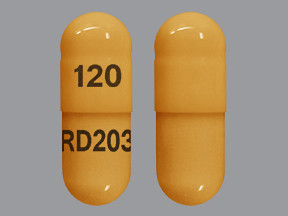
- color
- orange
- shape
- oblong
- imprint
- 120, RD203
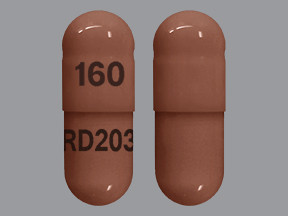
- color
- light brown
- shape
- oblong
- imprint
- 160, RD203

- color
- light brown
- shape
- oblong
- imprint
- 160, RD203
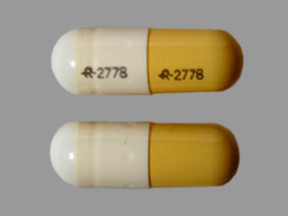
- color
- yellow
- shape
- oblong
- imprint
- logo and 2778, logo and 2778

- color
- yellow
- shape
- oblong
- imprint
- logo and 2778, logo and 2778
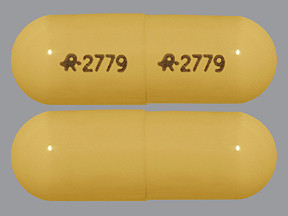
- color
- yellow
- shape
- oblong
- imprint
- logo and 2779, logo and 2779

- color
- yellow
- shape
- oblong
- imprint
- logo and 2779, logo and 2779
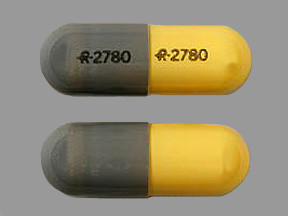
- color
- yellow
- shape
- oblong
- imprint
- logo and 2780, logo and 2780

- color
- yellow
- shape
- oblong
- imprint
- logo and 2780, logo and 2780
Reviews
Faq for PROPRANOLOL S.R. - ORAL
Propranolol S.R. is an oral medication that belongs to a group of drugs called beta-blockers. It is used to treat high blood pressure, angina (chest pain), tremors, irregular heartbeats, and certain types of migraines.
Propranolol S.R. works by blocking the actions of certain natural substances in the body, such as epinephrine, on the heart and blood vessels. This causes a decrease in heart rate, blood pressure, and the workload on the heart.
The dosage of Propranolol S.R. can vary depending on the condition being treated. It is important to follow your doctor's instructions and take the medication exactly as prescribed. Dosage may be adjusted over time based on individual response.
Common side effects of Propranolol S.R. may include fatigue, dizziness, lightheadedness, nausea, diarrhea, cold hands/feet, or slow heartbeat. These side effects are usually mild and may go away on their own. However, if they persist or worsen, it is recommended to consult your doctor.
It is important to inform your doctor about any medical conditions you may have, especially asthma, heart problems, liver or kidney disease, and diabetes. Propranolol S.R. may interact with other medications, so it is necessary to tell your doctor about all the drugs you are currently taking. Consuming alcohol while on Propranolol S.R. can increase the risk of side effects, so it should be avoided.
It is generally not recommended to take Propranolol S.R. during pregnancy, particularly during the first trimester. It is important to discuss the potential risks and benefits with your doctor. For breastfeeding mothers, small amounts of Propranolol S.R. may pass into breast milk, hence the need for cautious use. Consult your doctor before taking any medications while breastfeeding.
Propranolol S.R. can interact with several medications, such as other beta-blockers, calcium channel blockers, blood thinners, asthma medications, and certain antidepressants. Inform your healthcare provider about all the drugs you are using to avoid any potential interactions.
Warning
WARNING: Do not stop using this drug without first consulting your doctor. Your condition may become worse when the drug is suddenly stopped, especially if you have chest pain (angina) or heart disease (e.g., coronary artery disease, ischemic heart disease, high blood pressure). If your doctor decides you should no longer use this drug, you must gradually decrease your dose according to your doctor's instructions. When gradually stopping this medication, it is recommended that you temporarily limit physical activity to decrease strain on the heart. Seek immediate medical attention if you develop: worsening chest pain, tightness/pressure in the chest, chest pain spreading to the jaw/neck/arm, unusual sweating, trouble breathing, or fast/irregular heartbeat.
Disclaimer
IMPORTANT: HOW TO USE THIS INFORMATION: This is a summary and does NOT have all possible information about this product. This information does not assure that this product is safe, effective, or appropriate for you. This information is not individual medical advice and does not substitute for the advice of your health care professional. Always ask your health care professional for complete information about this product and your specific health needs.
No Reviews Yet